Experts Weigh-in on What the Post-COVID World Will Look Like

01/06/2021
It’s not a stretch to say COVID-19 has changed everything, from the way we work and learn, to how we access health care or cast ballots. We asked our resident experts at UML to weigh in on what we can expect in a post-pandemic world. They shared their perspective on a range of topics, from shopping to health care, from concert-going to the housing market. Here’s what they have to say:









